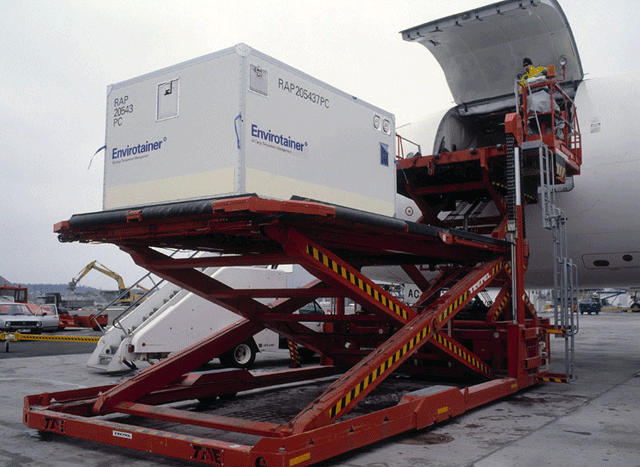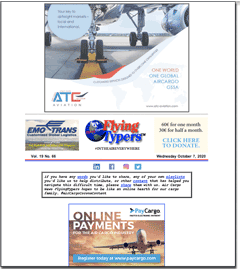 |
Unless you have been living on the moon,
or accidentally been locked up in a cool box since 1985, Envirotainer
has been the go-to way to move pharma and most other cold-chain commodities
for the past 35 years.
In the air with more than 6,000 active temperature-controlled
containers in the fleet at Envirotainer, all container types are FAA and
EASA certified.
 The
company reports that right now it is shipping around 2 million doses of
medicines per day for all major pharmaceutical manufacturers covering
more than 2,000 pharma trade lanes in over 100 countries at 300 airports. The
company reports that right now it is shipping around 2 million doses of
medicines per day for all major pharmaceutical manufacturers covering
more than 2,000 pharma trade lanes in over 100 countries at 300 airports.
In 2020 Envirotainer, we might mention that
pioneered the form decades ago, is still out front and leading the way
as the only climate neutral company in the cool-can industry.
We caught up with Mattias Isaksson, Head
of Marketing & Communications who must balance the challenge of lockdown
against the crushing humanitarian need to be there at the ready to deliver
precious life- saving and life-giving cargo to all four corners of the
earth on short notice.
FT: What
are the pandemic challenges how has the company met those challenges?
MI: I
believe our challenges are similar to most other companies. How do we
ensure our employees are safe while able to continue to work to ensure
the delivery of medicines to the people that depend upon them across the
world? So far, we have been successful, and we are running at 100% operational
capabilities and we have 0 missed orders this year, across the globe.
FT: What changes, additions or new products are offered or in line? How do
you follow up sales?
MI: We
annually re-invest approximately 20% of our revenue back into our network,
our fleet and new innovations. For example, we more than doubled our one-way
network in late March and took over the reverse logistics to help our
customers as air cargo space became scarce for repositioning. Like most
other companies we are not able to comment on new innovation before they
are launched but as I mentioned, it is a key area of investments for us,
so stay tuned for more.
FT: Are
there cooling solutions that are ready to be shipped?
MI: Yes,
there is definitely capacity and solutions available. From talking to
many pharma companies, we understand that in the beginning there will
be more frozen (-20C) shipments required as there is not that much stability
data available. Our dry-ice t-technology solution (RKN and RAP size) is
perfect for shipping -20C shipments and we have good availability of units
across the world. As stability data becomes available over time, it seems
like pharma companies will switch over to more 2-8C solutions. Also, here
we have very good availability with our RKN e1 and RAP e2 fleet. We are
also building more capacity to meet the demand we are foreseeing.
 |
FT: What
is your view of the capability of the global industry to meet the demand
expected, as vaccines and theraputics become available?
MI: We
have clients that remember the crisis at the end of the 90s, when a big
launch of a pharmaceutical product led to a shortage of containers. Now
there is a fear that the same thing will happen again. There is a calculation
originating from IATA, that it will take some 8,000 chartered aircrafts
to deliver all vaccines. We get a different, lower number when we look
at this.
Using our container fleet, we have calculated
that we can support all upcoming COVID-19 global vaccine shipments. And
still have capacity to support all our current business, across the world.
We have used some basic assumptions, for example that 50% of the world’s
population will be vaccinated in 14 months with two doses per person,
starting in November. Shipments will be five doses per vial, and we load
each pallet with 6,000 vials. 30% of deliveries will need cold chain shipment
by air freight. In this scenario, the total number of doses requiring
2-8C environment delivered over the coming 14 months amounts to 1.3 billion
doses and our free capacity, while still supporting 100% of our existing
business, is 2.2 billion doses. The equivalent numbers for -20C shipments
are 700 million doses and our free capacity is 1.0 billion doses.
FT: What
surprised you in 2020?
MI: I
think it goes without saying that the global Pandemic was something that
took us all by surprise. On the positive side, I believe that the temperature-control
air freight industry really worked hard to find solutions so that medicines
could still be shipped to patients, even though passenger travel dropped
to almost nothing, drastically reducing the available cargo capacity.
FT: What
are some of the challenges of operating a cool chain and what can air
cargo do to improve its chances of success in that business (pharma?).
MI: One
common challenge we all have is ensuring that all stakeholders have a
solid knowledge of what it takes to properly handle temperature-controlled
cargo. Envirotainer has trained over 27,000 cold-chain stakeholders for
free over the last couple of years to promote good practice and secure,
to the largest extent possible, that everyone that touches one of our
shipments has the best possible skill-set and training. We are running
at 0.1% temperature deviations and 0.0% product loss which I think is
a testament to all the hard work.
FT: Imagine
you are at a trade show, virtual or otherwise and someone enters your
booth and says, "tell me your story in two minutes, why do you matter
Envirotainer and what can I expect from you?"
MI: Envirotainer
is the world leader in air-transportation solutions for temperature-sensitive
pharmaceuticals. We develop, manufacture and lease temperature-controlled
air freight containers for cargo that require a safe and controlled environment
during shipment. We combine a truly global presence with the world’s
largest, and most CO2 efficient, active container fleet, the most extensive
network of stations and more than 35 years of industry expertise, to provide
cost-efficient and reliable solutions—available from any location
to any destination at short notice. We believe that our largest contribution
to a sustainable world is helping our customers have global access to
life-saving pharmaceuticals, through patient-safe, reliable and efficient
cold chain solutions.
FT: How
has your arrangement with companies everywhere worked?
MI: We
are in continuous dialogues with all our stakeholders to keep each other
up to date on what we are hearing and seeing. I believe it is important
to continue to keep all information channels open, with all the stakeholders,
so that we as an industry are as prepared as we possibly can for when
a vaccine becomes available and needs to be shipped across the world.
The sooner we get a heads-up, the better we can secure and re-allocate
containers if needed. We do have the capacity but need to know a little
in advance so that they are in the right place at the right time and in
the right quantities
Geoffrey |




